|
|
|
Sort Order |
|
|
|
Items / Page
|
|
|
|
|
|
|
| Srl | Item |
| 1 |
ID:
133716
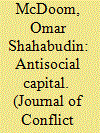

|
|
|
|
|
| Publication |
2014.
|
| Summary/Abstract |
Although popularly perceived as a positive force important for objectives such as economic development and democracy, social capital may also be linked to less desirable outcomes. This article highlights a dark side to social capital by pointing to its role in a particularly pernicious phenomenon: genocidal violence. Drawing on a survey of residents from one community that experienced violence during Rwanda's 1994 genocide, I show that individual participation in the violence was partly determined by the features of residents' social networks. Perpetrators possessed larger networks in general and more connections to other perpetrators in particular. The quality as well as quantity of connections also mattered. Strong ties generally, and kinship and neighborly ties specifically, were strong predictors of participation. In contrast, possession of countervailing ties to nonparticipants did not reduce a resident's likelihood of participation. Drawing on in-depth interviews to explore the possible mechanisms behind these findings, I suggest participants' networks fulfilled functions of information diffusion, social influence, and behavioral regulation. More broadly, the findings suggest the importance of social structure and social interaction for participation in collective violence. Relational data should complement individual attribute data in predicting participation. The findings also suggest, contrary to the neo-Malthusian interpretation, that the role played by Rwanda's extraordinarily high population density in the violence may have been more sociological than ecological in origin. The diffusion, influence, and regulatory effects of social connections are likely to be amplified in communities where individuals live in close spatial proximity to each other.
|
|
|
|
|
|
|
|
|
|
|
|
|
|
|
|
| 2 |
ID:
133712
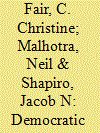

|
|
|
|
|
| Publication |
2014.
|
| Summary/Abstract |
A long-standing research tradition on political culture argues that greater support for core liberal values leads to a rejection of destructive political activities and reduced support for violent politics. In this vein, many contemporary analysts of security policy contend that a lack of democratic values in the Middle East promotes the development of violent political organizations. Unfortunately, there have been few direct tests of the hypothesis that an individual's rejection of democratic values correlates with support for militant groups. We conduct such a test in Pakistan using an original 6,000-person provincially representative survey. We find that strong supporters of democratic values are actually more supportive of militant groups and that this relationship is strongest among those who believe that Muslim rights and sovereignty are being violated in Kashmir. This is consistent with the context of Pakistani politics, where many militant groups use the principle of azadi (i.e., freedom and self-determination) to justify their actions. These results challenge the conventional wisdom about the roots of militancy and underscore the importance of understanding how local context mediates the influence of civic culture on political stability and violence.
|
|
|
|
|
|
|
|
|
|
|
|
|
|
|
|
| 3 |
ID:
133713
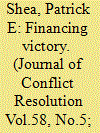

|
|
|
|
|
| Publication |
2014.
|
| Summary/Abstract |
With access to inexpensive credit, states can finance wars without overburdening their constituents, and face relatively small short-term costs compared to states with poor credit access. As a result of these economic benefits, states with lower credit costs will be more likely to win their wars, ceteris paribus. However, lower borrowing costs provide states domestic political benefits, which I argue are more important for democracies than nondemocracies. Since expensive credit forces states to rely on its citizens for revenue, governments that are more sensitive to their citizens' preferences are at a disadvantage. In sum, I argue that democracies are more sensitive to credit costs than authoritarian regimes. To test this theory, this article analyzes a data set of wars using logistic regressions and matching techniques, and examines the case of the Chaco War. The results demonstrate that the costs of borrowing have a substantial effect on war outcomes, and that these costs are more important for democracies than nondemocracies.
|
|
|
|
|
|
|
|
|
|
|
|
|
|
|
|
| 4 |
ID:
133718
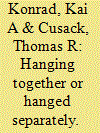

|
|
|
|
|
| Publication |
2014.
|
| Summary/Abstract |
What is the strategic role of membership in an intergovernmental group with unanimity requirements if the group negotiates with an external player in a setting with incomplete information? Being in such a group has a strategic effect compared to negotiating as a stand-alone player and reduces the demands of the outside player. Group membership lends additional bargaining power. Negotiating as a group may also cause more inefficiencies due to bargaining failure, and this may harm also the intergovernmental group. We uncover the role of preference alignment and preference independence between members of the coalition group for equilibrium payoffs and welfare effects. In this analysis, we also distinguish between coalition groups with and without side payments. Overall, coalition groups tend to perform well for the members of the coalition group in comparison to fully decentralized negotiations, particularly if the objectives of the members of the coalition group are not always perfectly aligned.
|
|
|
|
|
|
|
|
|
|
|
|
|
|
|
|
| 5 |
ID:
133715


|
|
|
|
|
| Publication |
2014.
|
| Summary/Abstract |
This article addresses the highly variable middle-class attitudes regarding political transitions and suggests that social mobility is a key factor conditioning its behavior. Social mobility creates a trade-off for the middle class between autocracy, which yields lower redistribution today, and democracy, which guarantees higher redistribution tomorrow. The way this trade-off is resolved impacts middle-class attitudes toward democratic transitions. Even when the middle class prefers lower redistribution levels under autocracy today, the middle class may prefer democracy today to guarantee higher levels of redistribution in the future, if it feels vulnerable about its future prospects.
|
|
|
|
|
|
|
|
|
|
|
|
|
|
|
|
| 6 |
ID:
133717
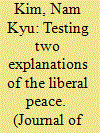

|
|
|
|
|
| Publication |
2014.
|
| Summary/Abstract |
Considerable evidence suggests that economic interdependence and integration reduce the likelihood of militarized conflict. However, scholars have devoted remarkably scant attention to testing different explanations of the liberal peace. This article offers an empirical test that can help adjudicate the two main arguments on the liberal peace: the opportunity cost and signaling arguments. Under the incomplete information assumption, I derive different observable implications of the competing arguments regarding how target states respond when challenged. By estimating selection models comprising dispute initiation and reciprocation, I find that, as challengers are more dependent on bilateral trade, targets are less likely to reciprocate disputes, which is supportive of the signaling argument. Regarding dispute initiation, increases in foreign direct investment and financial openness are associated with a decrease in the probability of conflict initiation. Last, the pacifying effects of the liberal economic variables are much more pronounced in contiguous and major dyads than in other dyads.
|
|
|
|
|
|
|
|
|
|
|
|
|
|
|
|
| 7 |
ID:
133714
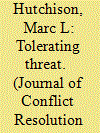

|
|
|
|
|
| Publication |
2014.
|
| Summary/Abstract |
Research on civil conflict focuses primarily on identifying underlying and proximate causes while leaving many questions of subsequent social consequences unanswered. Few studies have systematically examined how these conflicts affect public opinion, especially tolerance attitudes. Additionally, cross-national comparisons reveal significant differences in political tolerance levels but few explanations accounting for this variation. In this study, I bring together these disparate literatures and demonstrate the negative, independent effects of civil conflict on political tolerance levels across thirty-two countries. Examining data from the 1995-97 World Values Survey using several statistical techniques to ameliorate problems with endogeneity and multilevel data, I find that civil conflict dampens the public's willingness to extend basic civil liberties to nonconformist groups. By assessing the extent of domestic intolerance generated by various forms of civil conflict, this study makes important contributions to existing literatures and, more importantly, identify another obstacle to sustained peace in postconflict societies.
|
|
|
|
|
|
|
|
|
|
|
|
|
|
|
|
|
|
|
|
|